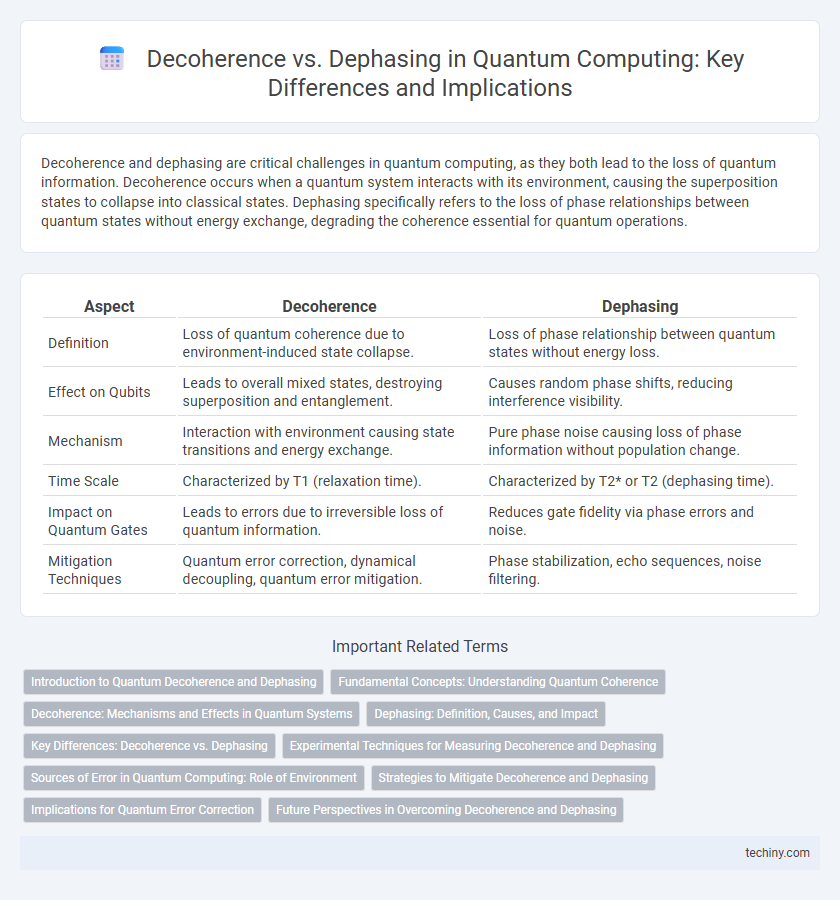Decoherence and dephasing are critical challenges in quantum computing, as they both lead to the loss of quantum information. Decoherence occurs when a quantum system interacts with its environment, causing the superposition states to collapse into classical states. Dephasing specifically refers to the loss of phase relationships between quantum states without energy exchange, degrading the coherence essential for quantum operations.
Table of Comparison
| Aspect | Decoherence | Dephasing |
|---|---|---|
| Definition | Loss of quantum coherence due to environment-induced state collapse. | Loss of phase relationship between quantum states without energy loss. |
| Effect on Qubits | Leads to overall mixed states, destroying superposition and entanglement. | Causes random phase shifts, reducing interference visibility. |
| Mechanism | Interaction with environment causing state transitions and energy exchange. | Pure phase noise causing loss of phase information without population change. |
| Time Scale | Characterized by T1 (relaxation time). | Characterized by T2* or T2 (dephasing time). |
| Impact on Quantum Gates | Leads to errors due to irreversible loss of quantum information. | Reduces gate fidelity via phase errors and noise. |
| Mitigation Techniques | Quantum error correction, dynamical decoupling, quantum error mitigation. | Phase stabilization, echo sequences, noise filtering. |
Introduction to Quantum Decoherence and Dephasing
Quantum decoherence refers to the loss of quantum coherence in a system, causing superposition states to collapse into classical mixtures due to interaction with the environment. Dephasing, a specific type of decoherence, involves the loss of relative phase information between quantum states without energy exchange, leading to reduced interference visibility. Understanding decoherence and dephasing mechanisms is crucial for improving qubit fidelity and advancing scalable quantum computing technologies.
Fundamental Concepts: Understanding Quantum Coherence
Quantum coherence refers to the maintenance of phase relationships between quantum states, essential for reliable quantum computation. Decoherence involves the loss of quantum coherence due to interactions with the environment, causing a quantum system to transition from a pure to a mixed state. Dephasing specifically describes the randomization of relative phases among quantum states without energy exchange, representing a primary mechanism of coherence decay in qubits.
Decoherence: Mechanisms and Effects in Quantum Systems
Decoherence in quantum systems arises from interactions between qubits and their external environment, causing the loss of quantum coherence and transitioning the system from superposition to classical states. Primary mechanisms include energy relaxation (T1 processes) and phase randomization due to environmental noise, which degrade quantum information fidelity. Understanding decoherence effects enables the development of error correction techniques and noise-resilient qubit designs critical for scalable quantum computing.
Dephasing: Definition, Causes, and Impact
Dephasing in quantum computing refers to the loss of coherence between quantum states caused by random fluctuations in the qubit's environment, leading to phase errors without energy loss. Key causes include magnetic field variations, temperature fluctuations, and interactions with surrounding spins or electromagnetic noise. Dephasing critically impacts qubit fidelity and limits coherence time, thereby reducing the accuracy and reliability of quantum operations.
Key Differences: Decoherence vs. Dephasing
Decoherence refers to the loss of quantum coherence caused by the interaction of a quantum system with its environment, leading to the decay of off-diagonal elements in the density matrix and effectively destroying superposition states. Dephasing, a specific type of decoherence, involves the loss of relative phase between quantum states without energy exchange, primarily impacting the coherence time (T2) in qubits. Key differences lie in their mechanisms: decoherence encompasses all environmental interactions causing system-environment entanglement, while dephasing specifically denotes phase randomization processes that reduce quantum information fidelity.
Experimental Techniques for Measuring Decoherence and Dephasing
Experimental techniques for measuring decoherence and dephasing in quantum computing primarily involve Ramsey interferometry and spin echo sequences, which allow precise characterization of qubit coherence times (T2* and T2). Quantum process tomography and randomized benchmarking provide additional methods to quantify noise and errors affecting qubit phase stability and coherence. Advanced cryogenic setups combined with high-fidelity microwave pulse control enable detailed analysis of decoherence mechanisms in superconducting and spin qubit systems.
Sources of Error in Quantum Computing: Role of Environment
Decoherence and dephasing are pivotal sources of error in quantum computing caused by environmental interactions disrupting qubit states. Decoherence results from energy exchange between qubits and their surroundings, leading to loss of quantum information, while dephasing arises from fluctuations in the qubit's phase due to environmental noise such as electromagnetic interference and temperature variations. Understanding these error mechanisms is crucial for developing error correction protocols and improving qubit coherence times in scalable quantum processors.
Strategies to Mitigate Decoherence and Dephasing
Strategies to mitigate decoherence and dephasing in quantum computing include error correction codes, dynamical decoupling, and quantum control techniques. Error correction codes like surface codes detect and fix qubit errors caused by environmental noise without collapsing quantum states. Dynamical decoupling sequences apply rapid pulses to qubits, averaging out fluctuations that lead to dephasing, while advanced quantum control protocols optimize qubit interactions to preserve coherence over longer durations.
Implications for Quantum Error Correction
Decoherence and dephasing represent distinct error mechanisms in quantum computing with critical implications for quantum error correction. Decoherence involves loss of quantum information to the environment, causing amplitude damping errors, whereas dephasing affects qubit phase coherence without energy loss, leading primarily to phase-flip errors. Effective quantum error correction protocols must address both amplitude damping and phase-flip errors to maintain qubit fidelity and achieve fault-tolerant quantum computation.
Future Perspectives in Overcoming Decoherence and Dephasing
Future advancements in quantum error correction codes and topological qubits show promise in significantly mitigating decoherence and dephasing effects, enhancing qubit stability. Development of novel materials with reduced environmental interactions and implementation of dynamic decoupling techniques aim to extend coherence times in scalable quantum systems. Integration of machine learning algorithms for adaptive noise correction is expected to further optimize qubit performance, accelerating the practical deployment of quantum computers.
decoherence vs dephasing Infographic

 techiny.com
techiny.com